Preventing and Treating Insect Bites & Stings
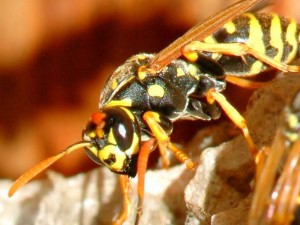 His skin had turned a pasty pale gray and he was sweating profusely. He collapsed to one knee and gasped for breath, grabbing his throat, just before hitting the ground nearly unconscious. Within minutes an ambulance was transporting him on a stretcher. The rest of us, many still seated around the campfire looked on in disbelief. Here I will share my story and my tips in for preventing and treating insect bites and stings.
His skin had turned a pasty pale gray and he was sweating profusely. He collapsed to one knee and gasped for breath, grabbing his throat, just before hitting the ground nearly unconscious. Within minutes an ambulance was transporting him on a stretcher. The rest of us, many still seated around the campfire looked on in disbelief. Here I will share my story and my tips in for preventing and treating insect bites and stings.
Beware of Biters, Stingers, and Buzzers Oh My!
This was about 25 years ago but the images of my Dad suffering an allergic reaction to what doctors believed was the bite of a spider, are still very vivid. Now before you get alarmed it is safe to say that the majority of insect bites and stings typically result in an itchy welt, some mild heat and swelling around the bite area. In some cases however, like that of my Dad, a person could have a systemic allergic reaction. This means the poison from the bite causes a reaction throughout the entire system or body of the victim. At its most severe, Anaphylaxis or whole-body allergic reaction can be life threatening. My Dad returned to us in much better shape the next day but the experience left me with a greater respect for nature and a crucial need to educate myself on how to handle insect bites.
Even if you are new to camping, you are most likely aware of the various types of insects that bite or sting and although some are regional, all of them can be found in wooded areas where camping is most desirable. “Good Times Right?” Well, being a good camper – just like a Boy Scout – means always being prepared.
Most Common Biting/Stinging Insects:
Biters
Mosquitoes, horse flies, black flies, sand flies, deer flies, tsetse flies, brown recluse and black widow spiders, fleas, ticks and leeches, some caterpillars and millipedes can also bite.
Stingers
Bees, wasps, hornets, yellow jackets, fire ants.
Treating Insect Bites and Stings: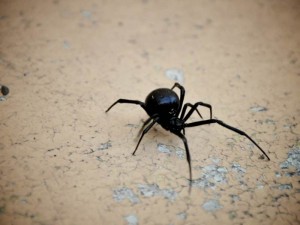
Venom Reactions
Venom reactions vary depending on the source but the good news is that for the majority of bites and stings, self-treatment will suffice. Never scratch or rub the bite area, that increases irritation and always gently wash area with soap and water. Ibuprofen works well for pain and swelling and an applied ice pack will help with the heat. Antihistamines (like Benadryl) work well to temporarily stop the itching and you can also use OTC hydrocortisone cream if you want a topical. Some people swear by vinegar or ammonia and many still use Calamine lotion. If you have a particular allergy to bee stings, make sure you always have your doctor prescribed epinephrine kit when you are in a high risk area. How do you know though when it is time to seek professional medical help verses the trusted home aid? Always remain calm, if you are with a bite victim have them sit or be still and call for medical care if symptoms show up anywhere outside of the bite area.
Ticks
Deer ticks can transmit Lyme disease, an inflammatory disease. Immediate removal of tick is crucial. Remove ticks immediately by pulling the head with a pair of tweezers. This will ensure that you get the entire body. Put the tick in alcohol to kill it and contact your doctor to see if you should save it for later identification.
Bees/Wasps/Hornets
If you can see the stinger in a bee sting, remove it to stop the venom exposure. The best way to pull out a stinger is with a plastic card, i.e. credit card. Put the flat edge of the card at the base of the stinger right up against the skin, then slide it along your skin firmly to remove the whole stinger.
Leeches
Remove leeches by using a finger nail or hard flat item to slide under the bite area and break the bite suction. Leeches have a substance in their saliva that disrupts blood clotting so the area may bleed longer then usual.
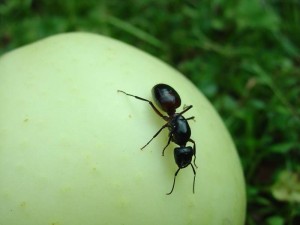 Symptoms After Being Bitten or Stung
Symptoms After Being Bitten or Stung
In most cases once you remove a stinger or leave a bite to heal you will not experience any severe symptoms. If you are allergic to one of these bites or stings some of these symptoms may occur:
*nausea* slurred speech*vomiting*muscle aches *chest pain*hives or skin redness*fever*abdominal pain*trouble breathing*facial swelling, lips, tongue*chills*weakness*dizziness, feeling like you are going to faint *disorientation *diarrhea*.
Do not wait for symptoms to subside or increase, seek professional treatment immediately. If there is any breathing or consciousness issues call 911. Regardless of symptoms, if any attacked area gets infected or does not heal, have it looked at by a medical professional.
Special Note:
Venom from the Black Widow Spider causes a systemic reaction which will require medical attention. Don’t wait for symptoms, call 911. If you can, bring the live or dead culprit with you when you get treatment for accurate identification and diagnosis.
Preventing Insect Bites and Stings:
So now that you know how to handle a surprise bite/sting reactions, how can you prevent it? Well of course the best way to prevent the reaction is not to get bitten in the first place so here are some reasonable tips to follow in preventing insect bites and stings.
- Do not swat at flying insects or disturb their natural habitats; bee hives, ant hills, wasp nests, spider webs, etc.
- Cover your body as much as possible by tucking your clothes in and especially tucking your pants into your socks. Wear gloves if you are exploring or gardening.
- Give yourself a full body check when you come inside. Especially look for ticks behind ears, between toes, on scalp, in groin, armpits, behind knees. If you swim in natural fresh bodies of water, take the time to check thoroughly for leeches in the same way.
- Be aware that spiders can hide anywhere so be cautious when you pick up firewood, or turn over a log for exploration. Pay attention where you are walking so that you do not walk into a web.
- Do not wear perfumes or perfumed sprays and lotions that would draw insects to you. Insects are also drawn to sweat so make sure you wipe your face, neck and any exposed area if you are sweating.
- Avoid locations insects multiply like ponds, lakes or any standing water.
- Do not handle interesting insects regardless of your curiosity.
- Lastly, wear an insect repellent when you are outside. There are now various natural repellents as well so do some research on one that meets your needs. Make sure you read the directions carefully so you understand how long the product is active.
Take these precautions in preventing and treating insect bites and stings, be aware of your surroundings, and know your body and we can all live together in harmony. There is no place like Camping. The biters, the stingers and the buzzers… Have FUN!
Author: Lisa Scott
Edited By: CampTrip.com

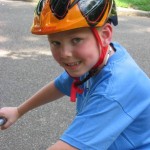

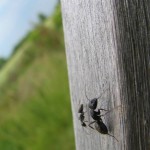
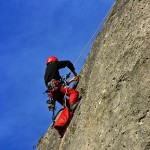
My daughter recently decided she wanted to go camping and I have a rare skin disease so this article was very helpful to me in preparing for my first camping trip. Hopefully if we go camping soon most of the bugs wont be up out of the ground yet.
Hi Kim,
That is exciting to be going on your first camping trip! I realize with excitement there must be worries. If you are worried about bugs my best advice would be: wear long sleeves and pants to protect your skin from bites and stings as well as the sun, wear proper shoes that will protect you if you step on anything nasty and keep your tent zipped at all times to prevent bugs from coming in. If your feeling experimental you can try hanging garlic in your tent, I haven’t tried this yet myself but I am curious 🙂 I agree with you, hopefully, depending on where you are camping it is still spring and most of the bugs have not come out to greet us yet- fingers crossed. I really hope you enjoy your first camping trip with your daughter. I would love if you could update me and let me know how it all went! Just remember camping is not perfect so just try and enjoy it for all that it is. Happy Camping!
I would not pin to much hope on Garlic keeping the bugs away, it is an old wives tale. I have actually tried this several times… I heard you should eat lots of garlic before your trip and that doesnt work either. Long sleeves, pants, hat and even gloves will help. A good bug spray is your only real hope.